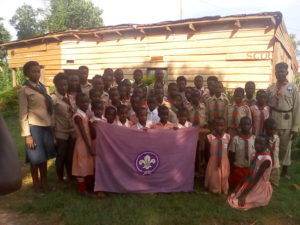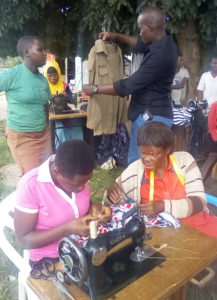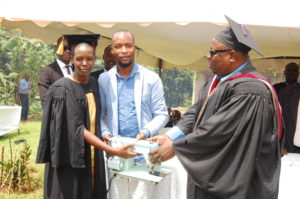
New Jersey DEP 2017 Recycling Award
By Michael Sabrio
Fall 2017
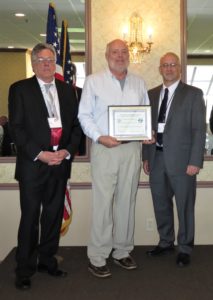
In October 2017, Pedals for Progress won a New Jersey Department of Environmental Protection (NJDEP) Recycling Award.
Dave Schweidenback accepted the award at the Awards Luncheon on 18 October 2017 in Neptune City, New Jersey. In the photo, Guy Watson, President of the Association of New Jersey Recyclers, is on the left in the black suit. Paul Orlando, Director of the Division of Energy Security and Sustainability, NJDEP, is on the right.
The award was for recycling activities in 2015 and 2016, but the application for the award was a chance to give the NJDEP an overall impression of P4P:
- The 4-page Program Narrative has information on our goals, history, business model, overseas partners, and domestic collectors and collection activities.
-
The 14-page Supporting Documentation has lots of specifics:
- what we shipped in 2015 and 2016
- our financial statements from 2016
- some info on collections
- some documents from the red-tape nightmare that Dave deals with for every shipment: bills of lading, letters to foreign customs departments, declarations of contents for the shipping companies, …
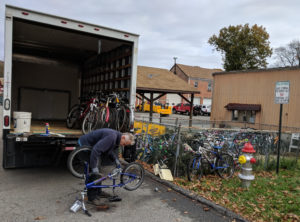
The supporting docs also contain a much appreciated letter of support from Liz Sweedy, our contact at the Morris County Municipal Utilities Authority. Besides running one of our most successful regular collections, Liz arranges for us to pick up bikes from the Denville recycling center, where Gary and I just picked up 59 more bikes on November 8th. In the photo Gary is doing what he’s done many thousands of times: processing a bike. He’s removing the pedals, one of the steps we take to make the bike as small as possible so we can fit as many bikes as possible into a container. The photo also shows our very own sign at the recycling center: “Pedals for Progress Bike Corral. NO removal of bikes or parts.”
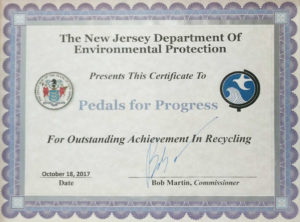
We’re not primarily a recycling organization, but when I did the math, I estimated that since 1991 we’ve shipped more than 4 million pounds of bikes and 74,000 pounds of sewing machines out of the U.S. Not all of this would have been dumped in landfills in the short term, but that’s where it would be sooner or later. And let’s not underestimate the encouragement we provide for cleaning out basements and garages!
Of course recycling is just a happy secondary consequence of our primary mission: to provide economic opportunity to people in developing countries.
Congratulations to P4P for this 2017 NJDEP Recycling Award. Now let’s get back to work.
President’s Message, Fall 2017
By Dave Schweidenback
Due to a confluence of events, both bicycle production and sewing machine production were sharply higher in 2017. An improving economy certainly means more bicycle sales and therefore more bicycles to recycle. P4P had a 12% increase in the production of bicycles; that means we were able to reach 12% more people.
Pedals for Progress is such a wonderful name. It explains in three words the total emphasis of our bicycle program. The name fits us. It never fit sewing machines. We had hit a ceiling of around 300 sewing machines per year, just couldn’t get the momentum to get much above 300. I determined that the problem was the name: Pedals for Progress did not explain collecting sewing machines.
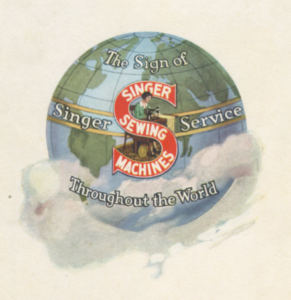
We coined the name Sewing Peace and registered it with the states and commonwealths, the federal government and the bank. It is hard to have peace when you do not have prosperity. A sewing machine is a job in a box. Sewing Peace does explain what we do in two words. Each sewing machine gives someone the ability to earn a living or at least to get by. Just that one change — a name that explains what we do when we are collecting sewing machines — resulted in a 56% increase in sewing machine production! Sewing Peace went from 327 machines collected in 2016 to 511 collected in 2017. And all indications are that we will have a similar rise in production in 2018.
To manage this rise in production we have added a number of new sewing machine partners, and in early 2018 we will be adding the first new bicycle partnerships since 2010. It’s so nice when a plan works.
But it is hard work: over 40 tons of bicycles and sewing machines we went out and processed, loaded into an Avis truck, brought back to our warehouse, unpacked, sorted, packed away and then unpacked and repacked into international shipping containers. Phew! Just saying it makes me feel old. Each bicycle and sewing machine gets picked up six to eight times before it is loaded. That means our staff and volunteers lifted 240 tons of metal in 2017. Yes it is very hard work, but it is very worthwhile.
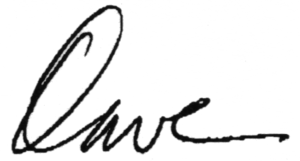
P.S. For fall 2017, we are trying yet another publishing method. Instead of producing separate newsletters — InGear for bikes and InStitch for sewing machines — we are combining all the articles into a single newsletter. Let us know what you think.
Treasurer’s Message, Fall 2017
Hi.
I’m Johnny Alexander, Treasurer of Pedals for Progress. Dave and I were Peace Corps volunteers and roommates in Sucua, Ecuador, for all of 1979. He often tells the story of our Peace Corps landlord who put to productive advantage one of the few bicycles in Ecuador. Sr. Peña was part of the inspiration for the founding of P4P.
Several years ago I joined the Board of Trustees and was elected treasurer. My wife Jane Divinski and I are long-time donors. I am starting this column to offer more financial insight and transparency to P4P.
You donors, volunteers, and stakeholders are the core of P4P. It is your time and treasure that sustain and power P4P. Because P4P operates as an IRS-qualified 501(c)(3) nonprofit, your donations may be used to reduce your tax payments.
I want to lead off my first column with an innovative and tax-saving way for retirees to donate to P4P. If you have an IRA or a 401k plan, this should be of interest to you. At age 70.5, you must begin to take Required Minimum Distributions (RMDs). You of course may begin your distributions earlier if you need or wish to. All IRA/401k distributions, except those in Roth accounts, increase your taxable income. The IRS will permit you to direct your IRA/401k administrator to make directed donations to 501(c)(3) nonprofits like P4P. The benefit is that if the money goes directly from your IRA/401k to a nonprofit, you avoid including it in your taxable income. Many wealthier seniors dislike the RMD because it can push them into a higher tax bracket and raise their taxes. The direct donation approach prevents this tax bracket creep. The outcome is that your total tax is lowered by a greater amount than if you report the income and take the deduction for your donation. If you wish to read more, here is a really good article, with examples, from the Wall Street Journal: The Benefit of Donating Your Required IRA Distributions to Charity.
I am sure that your tax advisor and financial institution can help you understand how advantageous this can be for you, given your financial situation.
In peace,
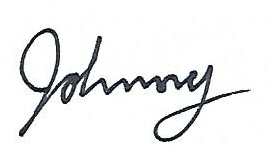
Pedals for Progress Bike 150,000
Fall 2017 InGear
The Summer 2017 InGear newsletter has a partial report on bike number 150,000. The report was partial because at publication time we had collected, packed, and shipped the bike, but it did not yet have an owner. Now that it does, we want to tell the whole story in one place.
Collected on Long Island
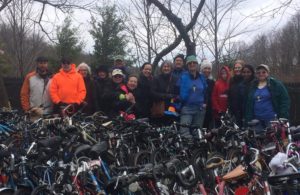
On April 1, 2017, the Long Island Returned Peace Corps Volunteers collected P4P bike number 150,000. The Long Island RPCVs have been one of our most successful collection partners. They rotate collections around Long Island to maximize their reach. Their first P4P collection was in 2003, their second in 2005, and they’ve held collections every year since. The Long Island RPCVs are featured in this article from Summer 2011.
Shipped from New Jersey
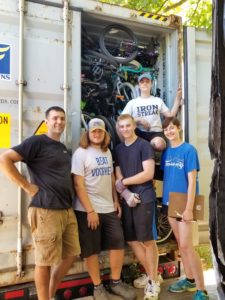
On April 22nd, volunteers from the Warren Hills High School Chess Club helped us load 575 bicycles into a 40-foot container bound for Chimaltenango, Guatemala. The Chess Club and their faculty advisor, Daryl Detrick, are no strangers to P4P. Along with the Computer Science Club, they have run 8 collections and packed 4 containers.
This was our 18th shipment to our partners at FIDESMA, for a total of 9,460 bicycles.
Arrived in Guatemala
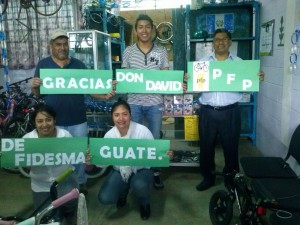
Our partners at FIDESMA report that bike 150,000 arrived in San Andrés Itzapa, Guatemala, at midday, June 6th.
FIDESMA, our Guatemala partner, got our 100,000th bike in 2006. FIDESMA has been our partner since 1999. Besides their bike program, FIDESMA runs programs in health and special ed, job skills and training, and environmental conservation.
We are good friends as well as professional partners with the staff at FIDESMA. The summer 2012 InGear newsletter has an article about a visit to New Jersey from Señora Maria Margarita Caté de Catú, founder of FIDESMA.
Here is the note and the inventory report from FIDESMA about Guatemala container #18 with the famous bike:
|
|
|
|||||||||||||||||||||||||||||||||||||||||||||||
P4P keeps track only of adult versus kids’ bikes. FIDESMA categorizes bikes in much more detail than we do! Also, we sometimes forget that plywood, which we use in the containers to separate rows of bikes, can also be useful to our partners. We translate the FIDESMA reports from the Spanish. In case you’re wondering, the Spanish word for chopper is ‘chopper’.
Delivered to Its New Owner
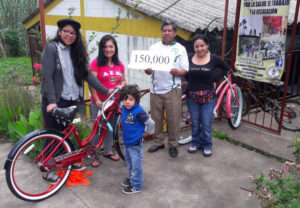
The owner of P4P bike number 150,000 is Noelia Chiquitá, a 17-year-old in her third year of high school. Noelia lives in Chimaltenango, Guatemala.
She plans to use her bike every afternoon to buy supplies for the family store, where she helps her mother in the afternoon after school.
The bike will also help her stay in shape and stay healthy.
Onward!
Recent collections have made a good start on our next 150,000 bicycles. Our trailers are full and we are waiting for the next opportunity to make a shipment.
Report from Albania, Fall 2017
Fall 2017 InGear
Albania has one of our most active partners, PASS/Ecovolis, which runs a wide variety of social and environmental programs. An Update from March 2017 mentions two of their programs. One uses P4P/SP sewing machines to make reusable shopping bags and the the other operates a children’s library, LibrAria.
Ened Mato, the PASS director, recently reported on two other PASS projects.
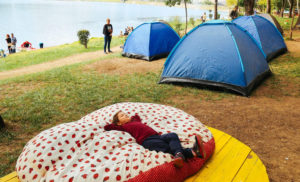
The School of Nature is a children’s program in the Albanian capital, Tirana. The goal of the program is to give urban kids some experience in nature while having fun and learning. Here are some examples of School of Nature activities:
- raise a tent camp
- plant different kinds of flowers
- read books
- paint
- take canoe trips on the artificial lake in Tirana
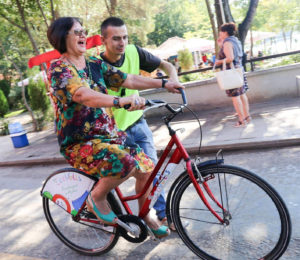 The Elders’ Academy is a program to teach older adults to ride bicycles. Some of the riders have not ridden a bike for many years and some have never learned to ride. I don’t know about you, but the thought of learning to ride a bike at age 50 or 60 sounds a little scary, especially in a busy city like Tirana. But in the photos we’ve seen, these “elders” look like they’re having a blast.
The Elders’ Academy is a program to teach older adults to ride bicycles. Some of the riders have not ridden a bike for many years and some have never learned to ride. I don’t know about you, but the thought of learning to ride a bike at age 50 or 60 sounds a little scary, especially in a busy city like Tirana. But in the photos we’ve seen, these “elders” look like they’re having a blast.
Ghana: Values of the Bicycle
By Ohemaa Sarfoa
Fall 2017 InGear
Because of its numerous uses, a bicycle could be a very cherished vehicle for its possessor. Forty-year-old Mr. Sapaku is a tailor. He has been using a bicycle in his daily dealings for the past ten years. Aside from the thrifty significance of the bicycle, it unknowingly gets rid of some health-related deficits in his body, as biking is a form of exercise.
As part of his schedule, he rides his bicycle to Winneba and back and so is able to keep fit. With his bicycle, he is able to procure all his sewing materials. Further, he distributes his finished garments on his bike. Owing to his work ethic, he never runs out of customers and this is so because of the bicycle. It has contributed a significant increment to his income.
However, recent years have not been so favourable for Mr. Sapaku. His bicycle broke down and efforts to repair it have been futile. Despite his efficiency in his work, his productivity saw a drastic decline. Without his bike, he was not able to deliver finished garments on time. Neither could he save money, now that he had to spend so much on public transportation.
Getting a new bicycle from WEBike caused a remarkable change for Mr. Sapaku. He is now able to save money he used to spend on transportation. In addition, he no longer has to deal with heavy traffic jams.
In summation, the bicycle is a frugal, time-efficient, and health-improving vehicle.
Ghana: Water as a Necessity
By Ohemaa Sarfoa
Fall 2017 InGear
One of the most important commodities in the lives of all living things is water: the body is made up of 70% water, and plants as well as animals need water for growth. Water is an undeniably substantive commodity in the livelihood of humans.
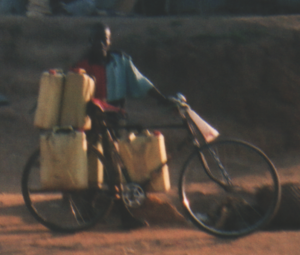
In spite of the importance of water, access to potable water is a great hurdle in some parts of West Africa, specifically Ghana. In some parts of the northern region of Ghana, human beings share the same water with animals. Animals also need water, but in these areas cattle drink and release their droppings in the same lakes and streams humans use.
Sabulugu is a village in the northern region of Ghana where there is little or no access to clean water. Inhabitants have to walk 3.5km to get drinkable water.
This has been the situation in Sabulugu for many years. Thanks to WEBike, though, there has been a change. The need to walk long hours for clean water has now been eliminated. Residents simply tie their water containers to their bicycles and bike to the stream and back in 30 to 40 minutes.
WE EXPRESS OUR PROFOUND GRATITUDE TO WEBIKE!
[Editor’s note: Although we have not been able to get a picture of the water carriers in Ghana, we have seen bicycle water-carriers before. In rural areas, the average Ugandan lives 4 miles from the nearest well. The photograph in this post is of a water carrier from Koytera Uganda. Water carriers put a 10-gallon jerrycan on each side of the back wheel, suspended from a piece of 1” x 3” wood, and then place two more 10-gallon jerrycans on top. That is almost 350 pounds of water! Then they push the bicycle to someone’s house where they dump the water into that person’s cistern for a few shillings and then ride back to the well with the empty plastic containers on the bicycle. They repeat this process dozens of times per day to earn a living and to supply people with the water they need.]
The Path to Financial Stability and Better Health in Uganda, One Stitch at a Time
By Patricia Hamill
Fall 2017 InStitch
Unemployment is not an unfamiliar topic these days. Reports on the economy and job growth are broadcast daily with the intention to give us a sense of momentum and hope. What many realize of course is that there is still a dearth of jobs with adequate compensation. Are the openings that are listed truly available or are they only posted because of policy or legalities and already filled internally? As frustrating as this is, people in developing countries don’t often have the opportunity to even question if a job is open, or to whom. There may not be any, filled or otherwise. This is the ongoing struggle we’ve been trying to have an impact on with our bikes and sewing machines, and our partners remind us how much our efforts change lives and futures.
We recently received a letter from Mathew Yawe, Director of the Mityana Open Troop Foundation (MOTF) in Mityana, Uganda, highlighting the success our program Sewing Peace has had in enabling young people and families to combat the devastation that the HIV/AIDS crisis has wreaked in the region. The loss of life to this epidemic has been reduced over the years, but the long-term effects on families and the economy are still quite apparent. That is why this Non-Government Organization (NGO) Mityana Open Troop Foundation has focused on aiding people in creating financial opportunities for themselves. The resulting income allows children to go to school and graduate, and thus be more likely to qualify for steady employment or business ownership.
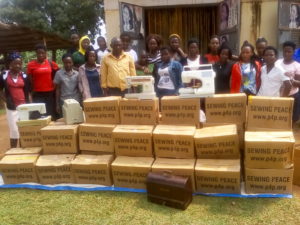
The direct correlation between education and employment and a lowered rate of disease and unplanned pregnancy is evident in much current research. So, of course, access to and use of doctors’ services and preventative healthcare is more likely only when one is able to afford the services. As a partner in the cause to fight poverty and its consequences, Sewing Peace shipped 73 refurbished sewing machines to MOTF in July for their vocational workshop in tailoring and design. The project recruits and trains the most vulnerable of the local population in many skills, including tailoring and garment production. The ratio was 1 machine to 4 people. Some of the machines were also made available for program graduates as start-up machines so they could create their own businesses.
In August, MOTF met with 51 residents in the village of Semukombe Mpigi to donate 2 of the sewing machines. The need here is palpable. So often, parents cannot afford the fees involved in sending their children to school. The cost of uniforms, books, and even transportation is prohibitive. The lack of access to proper health education adds to young women being expelled from school because of unplanned pregnancies. There is also the issue of families that lack an adult because one or both parents have succumbed to HIV/AIDS and the children cannot begin to consider any option other than survival.
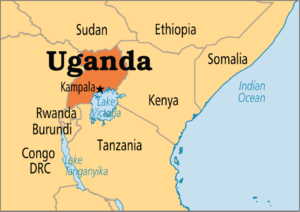 Here, the death of one particular man had greatly affected his two wives. One widow had 6 children. One had 5. The children had all dropped out of school because there was absolutely no income for fees. Access to medication, clothing, and food was all but eliminated. The donated machines would be the only tools these women have to reverse their circumstances and provide a stable future for the 11 youngsters. With care and maintenance, the sewing machines can also become the tools that some of the children can make use of to start their own businesses in the village or in areas like the capital city Kampala, about 22 miles away, where the population is much larger and the demand for school uniforms and other clothing promises a steady income. Ultimately, this kind of program can assist women in avoiding total dependence on their spouses or sons. Husbands and sons can rely on their whole family to participate in maintaining their wellbeing.
Here, the death of one particular man had greatly affected his two wives. One widow had 6 children. One had 5. The children had all dropped out of school because there was absolutely no income for fees. Access to medication, clothing, and food was all but eliminated. The donated machines would be the only tools these women have to reverse their circumstances and provide a stable future for the 11 youngsters. With care and maintenance, the sewing machines can also become the tools that some of the children can make use of to start their own businesses in the village or in areas like the capital city Kampala, about 22 miles away, where the population is much larger and the demand for school uniforms and other clothing promises a steady income. Ultimately, this kind of program can assist women in avoiding total dependence on their spouses or sons. Husbands and sons can rely on their whole family to participate in maintaining their wellbeing.
As our readers well know, project sustainability is always at the root of the success of an endeavor and MOTF must also consider the longevity of their vocational programs. Thus, some of the machines were sold to local tailors, offered at a fair and more affordable price than one could find in Kampala. These donations from P4P and the reasonable selling prices offered by MOTF are not easy to provide because the cost of shipping to inland locations like Uganda is substantial. Transporting the containers from the port in the coastal city of Mombasa, Kenya, over the approximately 700 miles of road to Kampala, Uganda, is not a simple task. The logistics of viable routes and reliable trucking becomes quite complicated causing the endeavor to cost half again as much money as it would to ship from New York City, through the Panama Canal, past Singapore, to Sri Lanka, and then to Kampala. This extra expense cannot be transferred to those in need, so it is our supporters and volunteers who ensure that no obstacle prevents the machines from getting to their destination.
As always, the effort continues. The private vocational institution MOTF is now looking to expand its program to include embroidery once a reliable machine can be located so they can also provide logos and names of the local schools whose uniforms they sew. With a continued flow of funding and sewing machines for training and sale, the reality of healthy, long lives and income stability in this region of Africa is attainable.
Reports from Uganda, 2017
By Mathew Yawe
Fall 2017 InStitch
[Our new partner in Uganda is the Mityana Open Troop Foundation, started as a Boy Scout group but now admitting girls. Their director Mathew Yawe has sent us several reports on their activites in 2017. For more perspective on Uganda in 2017, see the post in this newsletter by Patricia Hamill.]
Report of 29 July 2017
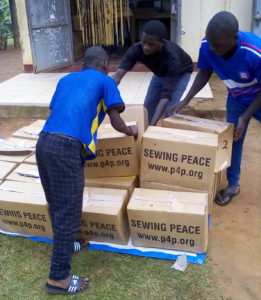
On 24 July 2017 Mityana Open Troop Foundation received 73 sewing machines from Sewing Peace USA. There were manual and electric machines all in good condition and looking so attractive.
Currently we have been lacking sewing machines to be given to our vocational project graduates as start-up tools to enable them to start their own workshops.
Here are our plans for the machines:
- 23 Machines will be installed in our vocational workshop.
- 10 Machines will be sold to graduates of November 2017, each for 200,000 Uganda Shillings (UGX): US $55. This money will be used to cater for shipping costs, custom taxes, ECU charges, handling charges, and transport to Mityana. The profits will be used to pay for the next shipment, which we hope to request this year.
- 40 machines will be sold to the artisans who need them at UGX 250,000 (US $69). Currently a sewing machine in Uganda costs US $83 or more.
Proposed Sewing Machine Workshop In Our Town
We have planed to set up a sewing shop and workshop in our Town of Mityana, where we shall be selling the sewing machines at a cheaper price, carrying out machine maintenance, knitting, making school uniforms, school badges, and embroidery work, as there is no any Embroidery machine in Mityana.
However, at our workshop, we shall be selling and repairing mountain bikes. And our trainees will be trained in how to repair sewing machines and bikes at our town workshop.
The generated funds, will help paying our vocational instructors / teachers.
Expenditures on the Shipped Sewing Machines
- Shipping from Sri Lanka: UGX 2,880,000 ($800)
- Uganda customs charges: UGX 1,520,700 ($422)
- ECU charges: UGX 2,261,000 ($604)
- Handling fees by Bolore Co: UGX 470,000 ($130)
- Transport from Kampala to Mityana: UGX 140,000 ($39)
- Total expenditure: UGX 7,271,700 ($1995)
I once again extend sincere thanks to Mr. David Schweidenback of the Pedals for Progress / Sewing Peace project. All volunteers worked so tirelessly in collecting and refurbishing and packing our donated sewing machines. They look so good and attractive. Thank you so much.
I finally thank Mr. Chris Eldridge, our project partner in the UK, who paid all the shipping costs and gave us much support in getting the machines to Mityana, Uganda.
Report of 27 October 2017
Today, 27 October 2017, I have conducted an Investiture Ceremony where 12 cubs, 15 junior scouts, and 8 rover scouts (totaling to 35 scouts) were investitured into the World Wide Scout Movement.
The function took place at the Trio Primary school. The scouts demonstrated marching, performed a flag ceremony, recited the scout promise and scout law, sang, etc.
Long live scouting.
Report of 4 November 2017
Today on Saturday, 4 November 2017, Mityana Open Troop foundation vocational trainees and scouts have volunteered at the Mityana District Police Station: hair dressing, weaving, hair washing, hair styling, hair braiding, and sewing. All the services were free of charge, done towards our vocational project trainee commissioning, due to take place on 18 November 2017.
For that event, we would like to cater for food for 600 guests and for the purchase of start-up tools for the graduating trainees, to enable them to start their own jobs right away.
Report of 18 November 2017 Graduation Ceremony
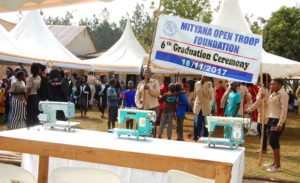
[We got another report from Uganda on the Mityana Open Troop graduation ceremony of November 18th. That report arrived too late for the original publication of the newsletter, but here are some excerpts. Click here for the complete report.]
Achievements
- This is our sixth graduation ceremony.
- The government of Uganda, through its Ministry of Education, supports our vocational project by giving funds for the instructors. The small fee we charge trainees caters for electricity, maintenance, and feeding, which is expensive.
- We registered the vocational project under the Uganda Ministry of Education.
- Kolping Mityana Womens project supports our project by sponsoring 10 orphans.
- Three Charity organizations — Fields of Life, Africa Renewal Ministries, and Unbound — sponsor some vulnerable children at our project.
- With support from profits got from the sold sewing machines from Pedals For Progress / Sewing Peace Project USA, plus some funds donated from Dr. Knight Anthony of Tools With a Mission UK, enable us construct the Girls dormitory which is to accommodate 50 students.
- We have been provided with educational seminars by hair beauty companies such as Movit and Darling.
- Pedals for Progress donates sewing machines and bicycles to our project, which have up-lifted and supported many of our activities.
- Carried out voluntary community work by cleaning and sweeping Mityana Central market, Taxi park, and surrounding streets.
- Volunteered in making hair dressing & weaving , sewing clothes for police ladies and police men Of Mityana Police station, at free cost. However, we carry out good turn in communities, as scouts.
Cameroon 2017: New Partner, United Action for Children
By Orock Eyong
Fall 2017 InStitch
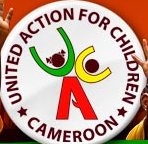
United Action for Children (UAC), based in Buea, in southwest Cameroon, is proud to be one of the newest partners of Pedals for Progress and Sewing Peace. UAC was founded in 1996 and registered as a non-profit community-based child- and youth-centered organization engaged in Grooming Small Minds for a Big Future and developing a caring society for children and young people through innovative programs.
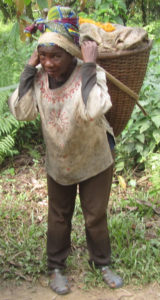
The overall goal of UAC is to contribute to the improvement of living conditions of affected populations such as rural families, children, and women. In line with its mission, UAC is involved in the following projects to meet the ever increasing needs of the affected populations:
- Basic Education to orphans and vulnerable children
- Entrepreneurship Education to out-of-school youths and low-income women
- School on Wheels programme to assist rural children and women
- Primary Health Care to cater for basic health needs of the rural communities
- Vocational Training to equip youths and low income women with employable skills and to make them job creators
The partnership with Pedals for Progress is very timely and important in helping UAC with its mission of strengthening rural children, women, and families. The job of equipping low income women, children, and young people with employable skills and making them job creators will be made easy as a result of strategic support from Sewing Peace through the donation of sewing machines. Indeed, 72 sewing machines are in transit now.
Ethiopia 2017: New Partner, Solar Energy Foundation
A Solar Energy Foundation (SEF) group based in Addis Ababa, Ethiopia, is one of our new 2017 Sewing Peace partners. Their new program is entitled “Marginalized Women’s Training on Sewing and Tailoring”. This Solar Energy Foundation project has the following goals:
- To train marginalized women in sewing and tailoring to help them become economically self-sustaining.
- To rehabilitate marginalized women by creating an enabling environment for self-employment using their sewing and tailoring skills.
- To help and support women economically, socially, and morally.
- To contribute to the development of marginalized women and support their dreams for a better future.
With the generous help of the Clif Bar Family Foundation and the Jack & Pauline Freeman Foundation, we shipped the sewing machines in March, 2017. At that time we published this post on Ethiopia #1. We were then in a bewildering bureaucratic nightmare with the Ethiopian Revenues and Customs Authority concerning what information they needed on each machine. The nightmare is over and we are happy to report that the machines have been delivered to our partner. (We’ve just gotten a report from Samson Tsegaye, the program director.)
The sewing and tailoring training will be held in Rema, one of the SEF training centers, located in the Mida Woremo district of North Shewa Zone, about 230km from Addis Ababa. The training is held in three three-month cycles starting in June 2017. Each session will include 20–25 trainees.
The trainees will be nominated from the North Shewa zone in partnership with the zonal education and women affairs office. Approximately seventy women will be the beneficiaries of this program. Those who successfully complete the training will be supplied with one sewing machine whereby they can begin their own business.
The training program covers the women’s travel cost as well as providing a daily allowance for basic needs such as food while they are in the training program.
We will report back when we have some results from the program.
Here is the full proposal for the program.
Ethiopia Report, November 2017
By Samson Tsegaye
Fall 2017 InStitch
Ethiopia has a population of more than 100 million. More than 85% live in rural areas. Women have most of the household responsibilities. Women and girls in Ethiopia are strongly disadvantaged compared to boys and men in several respects, including literacy, health, livelihood, and basic human rights. They also suffer from low status in their society and lack social support networks.
Since 2005, we at Stiftung Solarenergie-Solar Energy Foundation are trying to solve some of these problems in Ethiopia by providing solar technologies.
When I met Mr. David and he explained what Sewing Peace (SP) is doing, I was very impressed and asked him to support our disadvantaged women in Ethiopia. He agreed and we started the procedure.
Sewing Peace promised to donate 72 sewing machines and we at the foundation promised to provide training and disbursement of the machines. We will select disadvantaged women to train and give them one sewing machine to generate income and improve their lives. Here is our complete proposal.
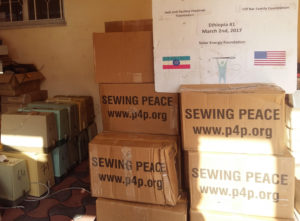
The process of importing the sewing machines to Ethiopia was very tiresome. Several times our customs and government offices requested new, authenticated documents from SP and required getting these documents from New Jersey to the Ethiopian embassy in Washington, D.C., to Ethiopia. For each machine, first they requested serial numbers, and then they requested date and place of manufacture. The process was complicated and expensive, but Mr. David made it happen — we received 72 sewing machines in Ethiopia on 24 July 2017. I would like to appreciate and thank Mr. David for his patience with the long, complicated import process.
We are now waiting for the training of the women and disbursement of sewing machines. But, due to the current political problems in the country, we couldn’t proceed according to our plans. Travelling out of town is difficult. We hope that this situation will be better soon and we will proceed with our programs.
We will soon finalize our project and will report in detail to Sewing Peace.
Best Regards,
Samson Tsegaye, Stiftung Solarenergie-Solar Energy Foundation Country Director
17-Nov-2017
Addis Ababa,Ethiopia
Report from Tanzania, Fall 2017
Fall 2017 InStitch
The Honorable Sophia Mwakagenda is a Member of the Parliament of Tanzania and the founder of the P4P/SP partner in Tanzania, the She Can Foundation. Starting in April 2016 she visited different constituencies in order to listen to the people and implement some of her She Can programs. A report from the Summer 2017 InStitch newsletter described the first part of that trip. We now have this new report on the next part of the trip: to the Chunya and Temeke regions of Tanzania.
Chunya Constituency Visit
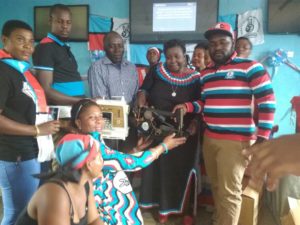
MP Mwakagenda presented two sewing machines to the Chunya Tailoring group, which is mix of women and men in Chunya constituency. They are in a joyous mood. This group started in 2007. They have about 12 sewing machines and now with the two new machines they are starting a tailoring school for girls and boys. It has 10 Members who are John Joseph, Ande Mwimba, Martina Kibali, Ndongolela Matembo, Twalangete Mwendemseke, Rehema Ambindwile, Julia Mwabenga, Mulyambate Mtagete, Jane Jansi and Asia Syabakeke. The group is an economic empowerment group for both men and women.
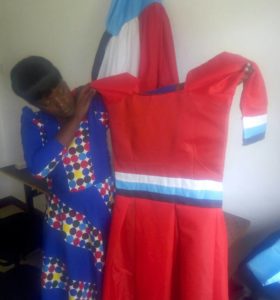
Ms. Martina Kipesile is Chairperson of the Msichana Girls Group. Ms. Kipesile, along with Christina Kalenga and other members of the group, use the five Sewing Peace machines that were distributed in the Chunya Constituency to make products that they sell. The Group also trains young women in the use of the machines.
Temeke Constituency Visit
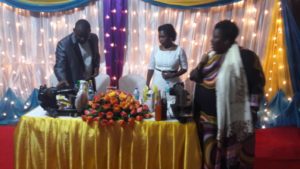
MP Mwakagenda gave a sewing machine to the women’s group of the Temeke Moravian Church in Temeke Constituency. Also in the photo are the Reverend Timothy Mwankenja and Ms. Stella Sematela, Chairperson of the Women’s Wing of the Church. The women’s group gives food and clothes to needy people around the church. The sewing machines will increase the church income for that purpose.
Conclusion
She Can Foundation staff will follow up during November and December 2017 on the different women’s groups which were given the sewing machines to see how they progress in terms of uplifting the living standards of women in the two locations. The technical staff will give the women support services to improve on their projects.
P4P Major Donors
| Major Donors |
|---|
John Alexander & Jane Divinski
Biovid
Sherman Carll
CCG Facilities Integration, Inc.
Jon and Diane Claerbout
Clif Bar Family Foundation
Eileen Fisher, Inc.
The Jack & Pauline Freeman Foundation
Jill & John Gower
Pamela Hanlon Charitable Fund
Jack & Donna Haughn
Robert & Laura Hockett
Leo & Helen Hollein
Elliott & Kathleen Jones
Gary & Mary Kamplain
The Herman & Seena Lubcher
Charitable Foundation, Inc.
Dorothy Magers
David Schweidenback & Geraldine Taiani
Thomas & Nancy Tarbutton
Wais Family Fund
Andrew Williams & Emily Winand
XA Foundation
Kermit Leslie Young, Jr.
|
Pedals for Progress 2017 Board of Directors & Trustees
John Alexander, Treasurer
UNIT 3230, BOX 470
DPO, AA 34031 – 0470
David Schweidenback, President & CEO, pd4ls@comcast.net
86 E MAIN ST
HIGH BRIDGE, NJ 08829
John Strachan
95 OLD YORK RD
HOPEWELL, PA 18938
Andrew Williams
210 PAVONIA STREET
JERSEY CITY, NJ 07303
Robert Zeh, Secretary
5 WOODS EDGE CT
CLINTON, NJ 08809
Staff
Gary Michel, Vice President, gary@p4p.org
Lori Smith, Office Manager, lori@p4p.org (908) 638-4811
Michael Sabrio, Webmaster, michael.sabrio@gmail.com
Our Partners
P4P/SP Active Partnerships as of November 19, 2017 ( 🌐 Map)
ALBANIA, Tirana, PASS, community development: 5,902 bikes (2010 – 2018), 230 sewing machines (2010 – 2018)
CAMEROON, Buea, United Action for Children, youth development: 72 sewing machines (2018)
ETHIOPIA, Solar Energy Foundation, small-business training and development: 72 sewing machines (2017)
GHANA, Accra, WEBikes, transport/small business/community development: 9,578 bikes (2006 – 2017), 556 sewing machines (2006 – 2017)
GUATEMALA, Chimaltenango, Fundacion Integral de Desarrollo Sostenible y Medio Ambiente (FIDESMA) small-business promotion: 9,409 bikes (1999 – 2017), 274 sewing machines (2003 – 2017)
KYRGYZSTAN, Cholpon-Ata, S.O.S, Kinderhoff, small-business promotion: 55 sewing machines (2008 – 2016)
LIBERIA, Monrova, Education Care Africa, Primary School children in Africa, 70 sewing machines (2017)
NICARAGUA, Rivas, EcoBici, community development: 25,569 bikes (1992 – 2017), 194 sewing machines (2003 – 2017)
TANZANIA, Dar es Salaam, She Can Foundation, community development: 217 sewing machines (2016 – 2017)
UGANDA, Mityana, Mityana Open Troop Foundation, community development: 137 sewing machines (2017)
Other shipments of bicycles between 1991 and 2017 have gone to non-profit agencies in Appalachia, Colombia, the Dominican Republic, Ecuador, El Salvador, Eritrea, Fiji, Ghana, Haiti, Honduras, India, Kenya, Madagascar, Malawi, Mexico, Moldova, Mozambique, Namibia, New Guinea, Pakistan, Panama, Peru, Senegal, Sierra Leone, the Solomon Islands, South Africa, Sri Lanka, Uganda, Vietnam, and Venezuela as well as other unlisted groups in Nicaragua.
Other shipments of sewing machines between 1999 and 2017 have gone to non-profit agencies in Cameroon, Costa Rica, the Dominican Republic, El Salvador, Georgia, Honduras, Jamaica, Moldova, Panama, St. Vincent/Grenadines, Sierra Leone, Uganda, and Yemen as well as other unlisted groups in Guatemala, Nicaragua, and Tanzania.
1997 total: 5,468
1998 total: 6,287
1999 total: 7,001
2000 total: 8,970
2001 total: 9,174
2002 total: 11,576
2003 total: 11,808
2004 total: 11,879
2005 total: 8,536
2006 total: 8,961
2007 total: 7,622
2008 total: 6,628
2009 total: .6,652
2010 total: 4,823
2011 total: 4,157
2012 total: 3,769
2013 total: 3,598
2014 total: 1,047
2015: 3,179 bikes, 310 sewing machines
2016: 2,760 bikes, 285 sewing machines
2017: 3,664 bikes, 533 sewing machines
2018 YTD: 973 bikes, 102 sewing machines
Twenty-Seven Year Bicycle Grand Total 153,467
Eighteen Year Sewing Machine Grand Total 3,939
Total Shipped
|
|
||||||||||||||||||||||||||||||||||||||||||||||||||||||||||||||||||||||||||||||||||||||||||||||||||||||||||||||||||||||||||

